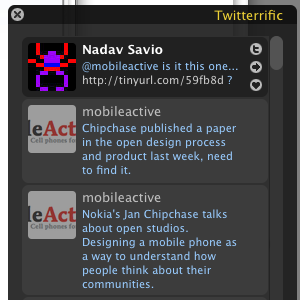Social computing
 Just had an interesting interaction. A colleague, while watching a talk, posted to twitter from her phone (I assume) that she wanted to find a document by the speaker. I was at my laptop and went and found it and replied with the URL. The interesting thing here from a mobile design perspective is the idea that the network optimized this task of finding the resource. It would have been difficult for her to do on her phone but it was trivial for me. I don’t know what to call this: micro-lazyweb or “responsibility shifting” or something. Oh, the link: Jan Chipchase - Future Perfect: (Nokia) Open Studios
Just had an interesting interaction. A colleague, while watching a talk, posted to twitter from her phone (I assume) that she wanted to find a document by the speaker. I was at my laptop and went and found it and replied with the URL. The interesting thing here from a mobile design perspective is the idea that the network optimized this task of finding the resource. It would have been difficult for her to do on her phone but it was trivial for me. I don’t know what to call this: micro-lazyweb or “responsibility shifting” or something. Oh, the link: Jan Chipchase - Future Perfect: (Nokia) Open Studios
When the blackbird flew out of sight,
It marked the edge
Of one of many circles.
from Wallace Stevens, Thirteen Ways of Looking at a Blackbird
Nowhere in the description of System One does the word “wiki” appear (well, actually, it does, but not very prominently). And that’s a good thing. Because “wiki” as such is an albatross. The benefits (openness to multiple editors, ease of page creation and editing) do not require the syntactical and linguistic baggage that comes with most wikis. And they bring with them one very serious problem: finding things. Wikis are great for information capture but not so great for information retrieval. To the point that I’ve been on more than one project that began with a wiki as the primary collaborative space and at one point or another the group agreed to abandon or augment it in favor of something else (Basecamp, word documents, etc.).
Take, for example, requirements writing. If all your requirements are in a wiki, each on a separate WikiPage, with all the extra discussional cruft that wikis seem to engender, they are not useful as requirements. Sure you can point to them and say: “There are the requirements” but you can’t easily design from them. Especially if they are constantly editable.
Obviously, this is in part about how you use your wiki, but the point is that tools encourage (afford, whatever) certain behavior. Wikis encourage adding information. They don’t encourage (though they require) managing that information.
Oh, System One? Looks really cool. Very academic approach (in fact, this is probably the most academic approach to product design I’ve ever seen produce an actual useful product). Looking forward to seeing the benefits of wikis leave their garden of semi-usefulness, and permeate the way we interact with information. (Thanks, John, for the link.)
Some good stuff on trust and personalization in the “Proceedings of the CHI2000 Workshop Designing Interactive Systems for 1-to-1 E-commerce.”
The Reputations Research Network should be useful, but (aside from a whole bunch of site-design problems) you can’t read the papers, so I’m not sure what good it does me. Maybe it’ll get fixed eventually. (via whump).
The implications of The Free Network Project (aka FreeNet) are pretty huge. Is this the end of intellectual property as it currently exists? Ian Clarke, whose idea it was, argues that copyright violation is a price worth paying for freedom from censorship. John Perry Barlow says there isn’t a choice anyway because we can’t control intellectual property anymore. I say simultaneously “Yikes!” and “Wheee! Free music!”
I saw a link to The Social Life of Documents, which looks really interesting. I hope I find time to read it ;)